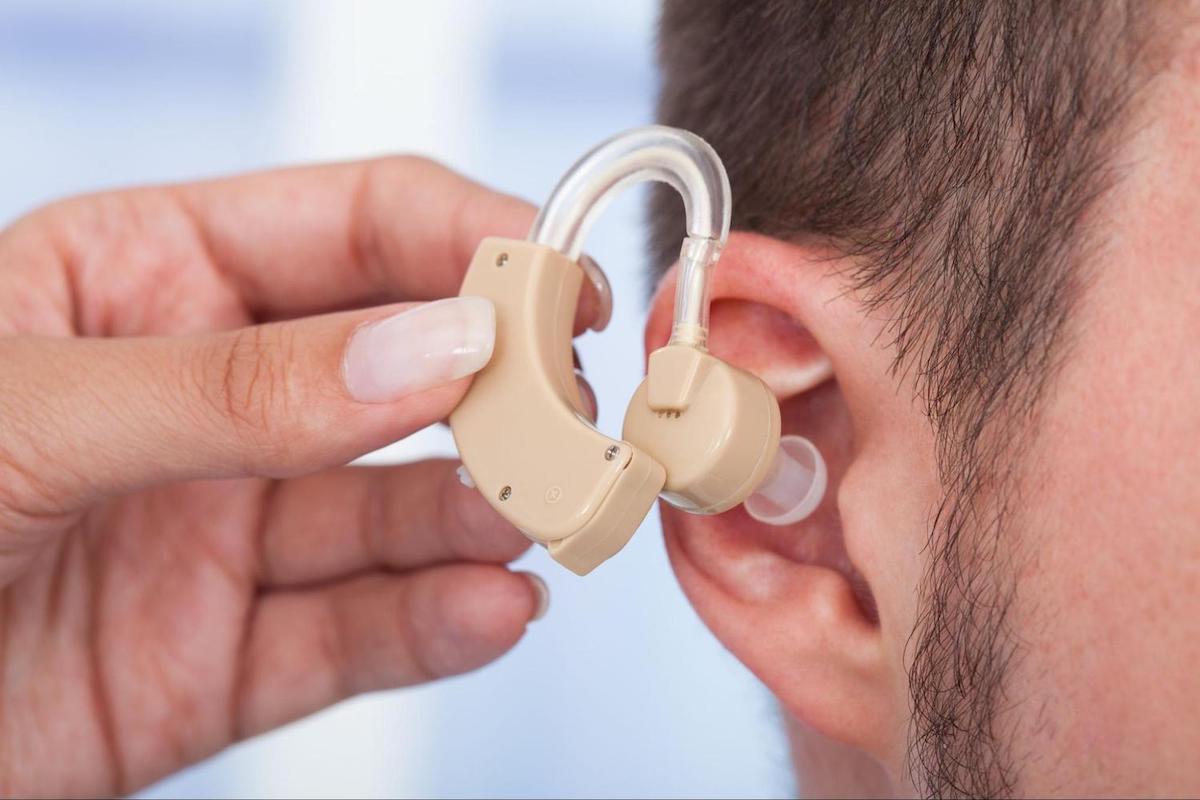Your hearing is a vital part of staying connected with loved ones, friends, and experiences in life. But only one-third of adults over the age of 70 with hearing loss have ever used hearing aids. And that number is even lower in younger adults with hearing problems.
Fortunately, direct-to-consumer companies are making these devices more accessible than ever.
Below, we’ll cover how to find the best online hearing aids, factors to consider before buying, and how to tell if online hearing aids will work for you.
How Do You Know if You Need Hearing Aids?
When you have hearing loss, you might have trouble picking up noises 30 decibels or higher, with 30 decibels being comparable to the sound of nearby whispering. But without hearing loss, you should be able to hear sounds at 25 decibels or less without a problem.
If something like excess earwax isn’t the cause of your hearing loss, it’s most likely normal age-related hearing loss.
If you feel that your hearing isn’t as good as it used to be, you can take a hearing screening test from the comfort of home. One option is FreeHearingTest’s phone hearing screening test. Another option is MDHearingAid’s online hearing test, which includes a free consultation with an audiologist. The consultation can help you determine your next steps depending on your test results.
If it turns out that you have normal age-related hearing loss, online hearing aids may be an excellent option — and you won’t need to make an in-person appointment to get your hands on them.
How Do Hearing Aids Work?
Hearing aids have come a long way in modern times, with new technology making it easier than ever to use them in various situations.
These hearing devices transmit sound signals to make listening and communicating easier, even if you have hearing loss. The wearer can adjust the device to create a customized solution to fit their hearing needs.
All hearing aids use a basic three-part system:
- Microphone: A microphone picks up sounds in your surroundings and converts them into signals.
- Amplifier (Processor): The amplifier processes the signals from the microphone to match your custom settings.
- Receiver: The receiver is what channels the soundwaves into your inner ear.
Factors to Consider When Choosing Online Hearing Aids
With all the options out there for buying hearing aids online, it can be hard to make a decision — especially if you’re a first-time buyer.
With that in mind, here are some factors that can make it easier to whittle down your choices.
Support From Qualified Professionals
When buying hearing aids online, it’s vital to choose a company that offers onboarding and support from licensed audiologists and hearing aid specialists.
Hearing aids aren’t one-size-fits-all, and purchasing from companies without support can leave you with a product that doesn’t work for you.
With that in mind, look for brands that work together with audiologists or hearing aid specialists to get you started. This way, you can rest assured that your hearing devices will fit your unique needs.
Settings and Programmability
High-quality hearing aids are customizable to fit your needs and the noise levels of your surroundings. So, always look for devices with adjustable settings.
At the very least, your hearing aids should be able to accommodate a range of different sound environments — including quiet, high frequency, and noisy situations like restaurants.
Thanks to modern technology, some of the best hearing aids even have Bluetooth connectivity. This feature allows you to adjust your settings through your Android or iPhone, giving you total control of your listening experience.
You can also listen to videos, audiobooks, podcasts — just about anything you can imagine — without having to switch to a pair of headphones.
Styles
Some of the most common styles of hearing aids are:
- In-the-ear (ITE)
- Invisible-in-the-canal (IIC)
- Completely-in-the-canal (CIC)
- Receiver-in-canal (RIC)
- Behind-the-ear (BTE)
Each type of hearing device has its pros and cons. For instance, smaller hearing aids that sit inside the ear canal may have lower battery life and less space to include new technology. On the plus side, they’re more discreet and may offer more natural sound quality.
Behind-the-ear hearing aids are slightly larger but still reasonably discreet. They sit outside of the ear with a tube that channels the sound waves into your ear. The pros of BTE devices are that they have longer battery life, are easy to maintain, have excellent sound quality, and are often cheaper than other styles that require custom fits.
All in all, it’s up to you and your doctor to decide which style of hearing aid suits you best.
Features
Here are some features to watch for on your search for new hearing aids:
- Noise reduction: Background noises can make it hard for those with hearing loss to make out what other people are saying. That’s why noise reduction is such a handy feature to have.
- Directional microphones: Directional microphones can boost your listening experience in loud places like restaurants or parties. With this feature, you can ensure that the conversation between you and loved ones doesn’t get lost in the noise of your surroundings.
- Rechargeable batteries: Rechargeability takes the hassle out of switching out batteries every time your hearing aids run out of power.
- Telecoils: Telecoils, or t-coils, are small copper wires that enhance the sound from phone calls or other audio systems when you’re wearing your hearing aids.
- Comfort: Since your new hearing aids will be a big part of your routine, comfort is essential. Your doctor can provide you with custom hearing aids made to fit perfectly in your ears. And nowadays, many non-custom hearing aids are also incredibly comfortable.
Pricing
The price of hearing aids can be a huge barrier for those who need them. And surprisingly, many insurance plans — including Medicare — won’t cover any of the cost. That means out-of-pocket prices could rack up to several thousand dollars, and many people cannot afford that.
Fortunately, with more direct-to-consumer hearing aids on the market, you can find excellent quality devices at much lower prices these days. Instead of spending thousands, you can find good-quality hearing aids for as low as a few hundred dollars.
Signs of High-Quality Online Hearing Aids
Before you start your search, you should always consult with a hearing specialist to determine which kind of hearing aid is best for your specific situation. Some direct-to-consumer companies will even offer consultations with an audiologist to help you find the right type for you.
That said, here are some signs that the hearing aids you’re considering are high quality.
Look for FDA Approval
The FDA classifies hearing aids as restricted devices, and all products marketed and sold as hearing aids must have FDA approval. If you stumble onto a retailer’s site that carries non-approved products, don’t purchase from them. Instead, look for companies that mention FDA approval on their website.
Beyond that, avoid companies making wild medical claims about what their products can do. No hearing aids will be able to restore damaged hearing — they can only help improve the quality of life of those with hearing loss.
Buy Hearing Aids With Trial Periods and Warranties
High-quality companies won’t leave you high and dry if it turns out that their hearing aids don’t work for you. That’s why you should purchase hearing instruments through companies that offer risk-free trial periods and warranties in case of faulty products.
Support From Audiologists or Hearing Aid Specialists
Above all, it’s critical to choose companies with licensed audiologists and hearing specialists on their team. The most trustworthy companies offer this type of support, while the companies don’t will not give the support needed to enjoy the benefits of hearing aids. These helpful staff members will help customers successfully use hearing aids and answer any audiological questions that come up.
Online Hearing Aid Options That Check All the Boxes
While the above tips and criteria are a good way to vet your options, here are three online hearing aid brands to give you a jumpstart on your search. These three meet all the criteria above and offer different price points:
- Eargo: $1,850 - $2,950
- Lively: $1,850 - $2,400
- MDHearingAid: $399.98 - $999.99
On the Path to Better Hearing
Hearing loss can have you missing out on important moments in life. And older adults who deal with hearing loss may even experience greater odds of depression. That’s why the technological advancements in hearing health care are so valuable.
To hear means that you won’t have to feel frustrated when communicating with friends and family. You can participate fully in all moments of life and stay connected with the people you love.
FreeHearingTest.org offers a free phone hearing screening test that can help you determine if you have hearing loss. It only takes about five minutes, and you’ll receive your results right away.
If you have a pair of headphones and eight minutes, you can also take MDHearingAid’s free online hearing screening test. Hearing health is essential, and these hearing tests are the first steps you can take to look after yours.

Alicia Schultz
Freelance Writer
Alicia Schultz is a Minnesota-based freelance health writer, coffee-lover, and wellness enthusiast. Much of her work is geared toward spreading knowledge that can positively impact the world. When she’s not writing, you can find her in the gym, hanging out with her family, or exploring somewhere new with her dog, Bonzo.



